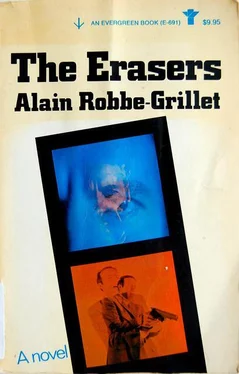Alain Robbe-Grillet - The Erasers
Здесь есть возможность читать онлайн «Alain Robbe-Grillet - The Erasers» весь текст электронной книги совершенно бесплатно (целиком полную версию без сокращений). В некоторых случаях можно слушать аудио, скачать через торрент в формате fb2 и присутствует краткое содержание. Жанр: Криминальный детектив, на английском языке. Описание произведения, (предисловие) а так же отзывы посетителей доступны на портале библиотеки ЛибКат.
- Название:The Erasers
- Автор:
- Жанр:
- Год:неизвестен
- ISBN:нет данных
- Рейтинг книги:4 / 5. Голосов: 1
-
Избранное:Добавить в избранное
- Отзывы:
-
Ваша оценка:
- 80
- 1
- 2
- 3
- 4
- 5
The Erasers: краткое содержание, описание и аннотация
Предлагаем к чтению аннотацию, описание, краткое содержание или предисловие (зависит от того, что написал сам автор книги «The Erasers»). Если вы не нашли необходимую информацию о книге — напишите в комментариях, мы постараемся отыскать её.
The Erasers — читать онлайн бесплатно полную книгу (весь текст) целиком
Ниже представлен текст книги, разбитый по страницам. Система сохранения места последней прочитанной страницы, позволяет с удобством читать онлайн бесплатно книгу «The Erasers», без необходимости каждый раз заново искать на чём Вы остановились. Поставьте закладку, и сможете в любой момент перейти на страницу, на которой закончили чтение.
Интервал:
Закладка:
Furthermore, it is still not certain that this Andre WS is the person Madame Bax saw from her window at nightfall, in front of the gate of the house in the Rue des Arpenteurs. The rip the drunk described in the back of the raincoat might have served to identify him, but the young post office employee has specified she saw nothing of the kind; now it is impossible, on this point, to take into account the affirmative testimony of the old maid, and the raincoat alone-without the rip-is not proof enough; any more-obviously-than the resemblance to Wallas which, if it were to be taken seriously, would just as well lead to accusing the latter.
Before leaving the commissioner, Wallas also examines a police report, the work of one of the two inspectors who, the evening before, made the first examinations of the dead man’s residence.
“You’ll see,” Laurent remarked as he handed him the slender file of typed pages, “it’s an interesting piece of work. This boy is a little young, of course: you can tell it’s his first crime. For instance, he wrote this memorandum on his own, since our investigation has officially been interrupted. I even think he must have made additional investigations on his own account, after having been told to finish up. The enthusiasm of a neophyte, you understand.”
While Wallas is reading the document, the commissioner makes a few further remarks-apparently ironic ones-as to the young inspector’s conclusions and the naivete with which he has received the suggestions of people who “obviously were taking him in.”
The text begins as follows: “On Monday, October twenty-sixth, at eight minutes after nine…”
The first pages discuss in detail, but without digressions or commentary, the telephone call from Doctor Juard and the information furnished by the latter as to the professor’s death and the attack itself. Then comes an extremely precise description of the house and its environs: the corner of the Rue des Arpenteurs, the little garden with its hedge of spindle trees and its fence, the two doors to the house-one in front, the other at the rear-the arrangement of the ground-floor rooms, the staircase, the carpet, the study on the second floor; the arrangement of the furniture in this last room is also analyzed in scrupulous detail. Then follow the police observations proper: bloodstains, fingerprints, objects apparently not in their normal place or position…“lastly the fingerprints number 3-right hand-also figure distinctly on a cubical paperweight weighing between seven and eight hundred grams, placed to the left of the manuscript page-about ten centimeters away.”
Aside from these exaggeratedly detailed notations, the memorandum furnishes more or less the substance of the first reports made by the inspectors, to whom Laurent had introduced Wallas this morning. However, two new indications appear in it: the recent damaging of the buzzer system at the gate (which is no news to Wallas) and fresh tracks discovered on the narrow strip of lawn along the west end of the house; the measurements of these footprints are indicated, as well as the average length of the strides.
A little more attention is paid, this time, to the housekeeper’s words. Wallas even recognizes, in the phrases quoted, the old woman’s favorite expressions. In particular, the complete story of the damaged telephone line is given and Madame Smite’s vain efforts to have it repaired.
After taking the housekeeper’s testimony, the zealous inspector has interviewed the concierge from the apartment house across the street and the manager of a “small cafe located some twenty yards away, at number 10”-the Cafe des Allies. The concierge refers to the regular visitors to the house; he himself often sits-particularly in the spring and summer-on his doorstep in the afternoons, just opposite the garden gate; consequently he has been able to observe that very few people visited the victim: the postman, the employee from the public utilities system, occasionally a salesman of Venetian blinds or vacuum cleaners, as well as four or five gentlemen whom it is difficult at first glance to distinguish from salesmen-for they wear the same type of suit and carry the same briefcase-but who are businessmen from the city, professors, doctors, etc. It is apparent that the author only reproduces all these trifling remarks out of a concern for objectivity; and despite the care he takes to present what follows with the same detachment, he obviously regards it as much more important. It concerns a young man, apparently a student, extremely simply dressed, short, even somewhat puny; this boy had apparently come several times during the course of the summer, then after a lacuna of more than a month, three times in a row during the second week in October-the week when it was so warm; since the window of the room where Dupont was sitting was open then, the concierge could hear the tone of the conversation frequently rising during these visits; the last day, the visit ended in a violent quarrel. It was the young man who did most of the shouting, the concierge thinks; this boy seemed very nervous and may have been drinking a little too much-he sometimes went into the Cafe des Allies when he left the professor’s house. Lastly, the day before the murder, he walked along the canal with a friend-much taller and stronger than himself, and certainly older too. They stopped in front of the little house and the student pointed to one of the rooms on the second floor; he was obviously overexcited, he was explaining something to his companion with animation, making threatening gestures.
Although Madame Smite is extremely deaf (and “rather peculiar”) and “seems to be completely ignorant of her employer’s associates,” it is possible that she can give the name of this young man and say what he was doing in the house.
It would be best to question the housekeeper once again; unfortunately she has left the city. In her absence, the inspector has attempted to question the manager of the Cafe des Allies; he points out, by the way, that “members of this profession are generally quite well informed as to the private life of their customers.” The manager had no desire to talk, and it required all the inspector’s patience and diplomacy to get to the bottom of the affair:
Some twenty years ago, Dupont “had relations regularly” with a woman “in modest circumstances” who, subsequently gave birth to a son. The professor, who had “done everything to keep this regrettable event from occurring” (?) and whom the woman attempted to pressure into an alliance, persisted in his refusal to marry her. Finding no other way to bring to an end the “proceedings of which he was the object” he soon afterward married a young girl of his own circle. But the illegitimate child, having grown up, now returned with the intention of obtaining large sums of money, “which provoked stormy arguments whose echoes were heard by the neighbors.”
In his conclusions, the inspector begins by proving that Daniel Dupont himself has, on a number of points, “distorted the truth.”
“The mere examination of the material evidence,” he writes, “proves, without there being any need to bring in the evidence of the witnesses, that:
“First, there were two aggressors, not just one: the man with the small hands (fingerprints number 3) and small feet (tracks on the lawn) who took such short strides, cannot be the one, necessarily tall and strong, who twisted the wire of the electric buzzer at the garden gate; furthermore, if the first man was obliged to walk on the lawn to avoid making the gravel crunch, it is because there was already someone walking beside him, on the brick rim of the path; had he been alone, he would have chosen this wide rim himself.
“Second, at least one of these two men was familiar with the house and not an anonymous malefactor: it is apparent that he was well acquainted with the premises and the household habits.
Читать дальшеИнтервал:
Закладка:
Похожие книги на «The Erasers»
Представляем Вашему вниманию похожие книги на «The Erasers» списком для выбора. Мы отобрали схожую по названию и смыслу литературу в надежде предоставить читателям больше вариантов отыскать новые, интересные, ещё непрочитанные произведения.
Обсуждение, отзывы о книге «The Erasers» и просто собственные мнения читателей. Оставьте ваши комментарии, напишите, что Вы думаете о произведении, его смысле или главных героях. Укажите что конкретно понравилось, а что нет, и почему Вы так считаете.












